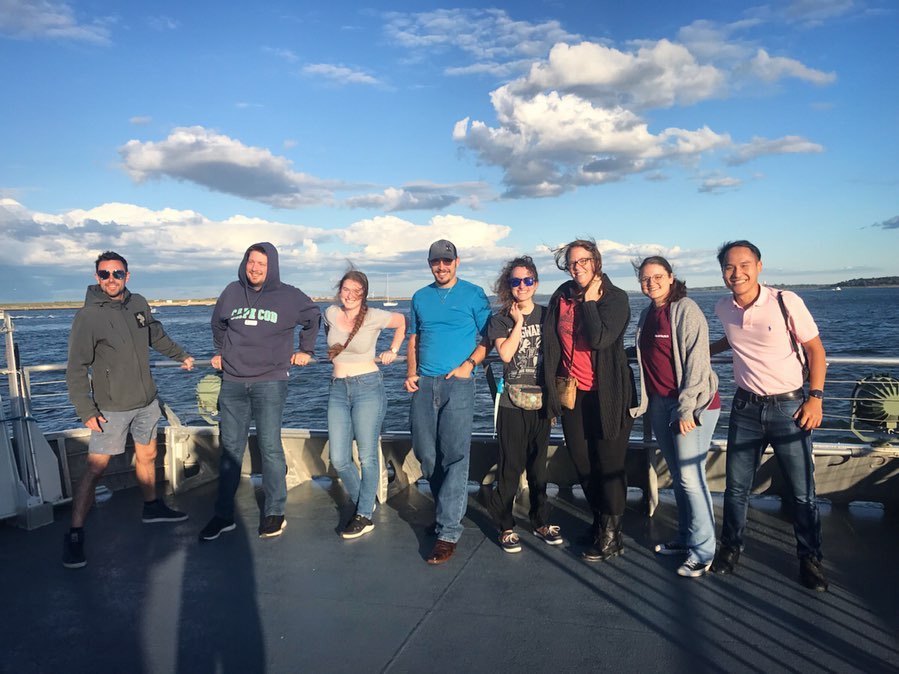A two hours' sail across Massachusetts Bay from Boston lies the heart of American theatre: a historic fishing village where tavern signs and carriage lamps invite visitors into venues dotting the narrow streets. The village has been a retreat for artistic pilgrims since the nineteenth century, including such titans as Eugene O'Neill (1888-1953) and southern playwright Tennessee Williams (1911-1983). This unassuming village at the tip of Cape Cod hosts a festival dedicated the legacy of Williams's famous works and his obscure "late plays," which moldered in archives for years after his death: The Tennessee Williams Festival, now in its 14th year, in Provincetown. And this represents the 8th year that Texas Tech has brought graduate scholars to learn from the town, the plays, and a host of scholars who are dedicated to our education and enlightenment.
My misimpression that the Festival productions were to be presented as museum pieces was belied by painted parasols indicating scenery, a puppeteer's hair and head used for a stage, and waves lapping at the shore in a site-specific production – the list goes on. Never was there a moment without wonder. The Festival's broad array of plays in an equally broad selection of styles were invaluable testaments to the theatre's creative capacity. As founder and curator David Kaplan states, the plays contextualize one other, expanding the possibilities of interpretation and production.
 The Tennessee Williams Theater Festival has for over a decade celebrated the international
influence of America's great playwright by presenting his works alongside those of
artists he inspired. This year's companion pieces were gathered from the wealth of
plays penned by Japanese actor, playwright, and author Yukio Mishima (1925-1970) to
highlight the influence of Mishima and Williams on one another, and their merger of
traditionalism and modernity. As a student in the scholar's class, I sifted through
a host of readings this summer, and met with fellow grads in a class to discuss them,
led by Dr. Charney (the creator of this partnership eight years ago).
The Tennessee Williams Theater Festival has for over a decade celebrated the international
influence of America's great playwright by presenting his works alongside those of
artists he inspired. This year's companion pieces were gathered from the wealth of
plays penned by Japanese actor, playwright, and author Yukio Mishima (1925-1970) to
highlight the influence of Mishima and Williams on one another, and their merger of
traditionalism and modernity. As a student in the scholar's class, I sifted through
a host of readings this summer, and met with fellow grads in a class to discuss them,
led by Dr. Charney (the creator of this partnership eight years ago).
The epitome of the dynamic duality between modern and traditional methods showcased in the Festival was embodied by two sequent productions: One by Portland State University Kyôgen Company and the other One-Eighth Theater. Each company produced a version of a 400-year-old Japanese farce (kyôgen). Busu; or, The Delicious Poison tells the story of two feckless servants who devour their master's sugar store, then devise a plan to escape punishment. Portland State's starched traditional rendition was followed by One-Eighth Theater's pumpkin-smashing, beer-spewing, Jello-smearing interpretation that, despite its outlandish production values, maintained absolute fidelity to Mishima's original text.
As each play contextualized the other, so too The Tennessee Williams Institute dug deep into the production values and their origins. An intermingling of artists and scholars (some of whom performed in or worked on Festival productions), the Institute encourages educational engagement with material presented at the Festival. As one of eight students in Texas Tech Theatre's companion course, I was immersed in the appreciation and study of these artforms before venturing to New England. Having spent the better part of a week attending ten plays and as many seminars, I left the Festival with a notebook full of new interests to fuel my studies. It was the first conference I have attended as a scholar, and although the Provincetown Pilgrim Monument may have disappeared over the horizon as the ferry sawed its way back to Boston, the memory of this wondrous experience will endure.
